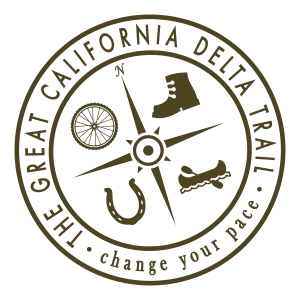Regional Economy, Recreation and Tourism
On this page: Economic Sustainability Plan | Socioeconomic Indicators | Recreation and Tourism Survey Report
 Looking for the Great California Delta Trail? You can now find it here.
Looking for the Great California Delta Trail? You can now find it here.
Regional Economy
Economic Sustainability Plan
The 2009 Delta Reform Act (Public Resources Code section 29759) requires the Commission to prepare an Economic Sustainability Plan (ESP) for the Delta region. The Commission adopted the ESP in January 2012. It includes information about the Delta’s agricultural and recreation economy, levees, public safety, and the impacts of the Bay Delta Conservation Plan and isolated conveyance (as proposed at that time). The Commission used the ESP to develop a set of recommendations that informed the Delta Stewardship Council’s Delta Plan policies concerning the socioeconomic sustainability of the Delta region.
Chapter Updates
The Commission updated two chapters of the ESP, gathering the most current data on recreation and tourism, and agriculture.
Recreation and Tourism Chapter Update (2020)
Initiated in 2019, the Recreation and Tourism chapter update includes a review of recreation and tourism studies completed after 2012 and the results of five focus groups held between March and April 2020. The updated chapter includes best available current data, analysis of visitation, economic activity, and emerging recreation and tourism trends.
Prior to Commission approval of the chapter update at the March 2021 meeting, Commission staff received input on the draft at virtual public workshops held in December 2020 and January 2021.
December 2020 Public Workshop
January 2021 Public Workshop
- January 2021 Meeting Video
- January 2021 Meeting Summary (Coming soon)
Agriculture Chapter Update (2019-2020)
Initiated in 2017, the Agriculture chapter update includes a revision of Delta agricultural land use and the resulting contribution to the Delta economy, utilizing 2016 crop year data. In addition, the update included an analysis of the impact of proposed Delta restoration projects on the Delta agricultural economy.
Other reports also modeled the impact of salinity in Delta water supplies on Delta crop choice, and a review of how climate change (primarily warmer air temperatures) could influence future crop choices in the Delta. For more information on these two latter reports, please contact the Commission at dpc@delta.ca.gov.
- Salinity and Crop Choice in the Sacramento-San Joaquin Delta (2020) – Available by request
- Climate Change Vulnerability in the Sacramento-San Joaquin Delta: Agriculture and Levee Impacts (2019) – Available by request
Socioeconomic Indicators for the Delta
The Socioeconomic Indicators Report provides a quantitative snapshot for benchmarking policy progress in the Sacramento-San Joaquin Delta region. The data presented offers a set of statistical indicators that can be replicated on a continual basis to monitor and track the socioeconomic health and vitality of the Delta region.
Socioeconomic Indicators Update: The Sacramento-San Joaquin Delta (2025) (PDF)
Socioeconomic Indicators Report: The Sacramento – San Joaquin Delta (2019) (PDF)
Recreation and Tourism
Recreation and Tourism Survey Report
This study represents the findings of a research effort conducted by California State University, Sacramento and funded by the Commission. The Sacramento-San Joaquin Delta is a dynamic system of human communities and the natural environment. Up-to-date understandings of the social dimensions of recreation and tourism in the area should be considered when adapting approaches to managing the Delta region. The work performed in this research effort aims to provide information on visitor and local resident recreation preferences and information sources they utilize when choosing recreation opportunities. Additionally, this report includes economic impact and significance analyses of two annual events.
- Delta Recreation and Tourism Survey Report (2019) (PDF)
- Delta Recreation and Tourism Survey Infographics (2019) (PDF)
If you are interested in receiving updates, join our mailing list.

